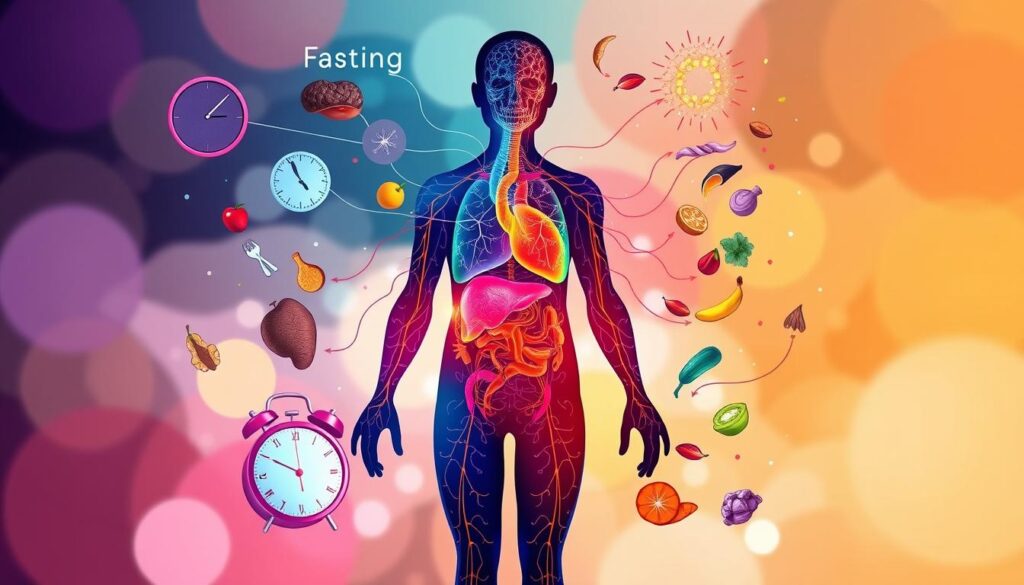Did you know fasting can improve health markers and reduce stress? It’s been practiced for centuries. Fasting science shows it boosts metabolic health, increases autophagy, and enhances insulin sensitivity. This makes it a great option for improving health.
Fasting is complex, and understanding its science is key. There are many fasting types, like intermittent and prolonged fasting. Finding the right one for you is important. By learning about fasting’s benefits, like better insulin sensitivity and autophagy, we can improve our health.
Key Takeaways
- Fasting has been shown to improve biomarkers of disease and reduce oxidative stress.
- Intermittent fasting can lead to improved insulin sensitivity and increased autophagy.
- Fasting can be beneficial for weight loss and improving metabolic health.
- It’s essential to understand the science behind fasting to maximize its benefits and minimize its risks.
- Individuals should consult with a healthcare professional before starting any fasting regimen.
- Fasting may not be suitable for everyone, particularlly those with certain medical conditions or nutritional deficiencies.
- Autophagy and insulin sensitivity are key benefits of fasting, leading to improved overall health.
Understanding Fasting: Definitions and Types
Fasting has been around for centuries. Over time, different methods have emerged. It’s important to know about intermittent fasting, time-restricted eating, and extended fasting. Intermittent fasting alternates between eating and fasting. Time-restricted eating limits your eating to a set number of hours. Extended fasting goes longer, often 24-72 hours.
Mark Mattson, a neuroscientist from Johns Hopkins, says intermittent fasting can make you live longer, be leaner, and sharper. It can also improve heart health, physical performance, and manage type 2 diabetes. But, it’s not safe for everyone, like children, teens, pregnant women, or those with eating disorders.

Clean fasting means eating whole, nutrient-rich foods when you do eat. The Mediterranean diet is a good choice for health. Time-restricted eating works well, like the 5:2 diet. This diet lets you eat normally five days a week and limits calories to 500-600 on the other two days. Extended fasting can be good, but listen to your body and adjust your fasting duration as needed.
Here are some key points to consider when choosing a fasting approach:
- Intermittent fasting: alternate between eating and fasting periods
- Time-restricted eating: restrict eating to a specific time window
- Extended fasting: fast for longer periods, typically 24-72 hours
- Clean fasting: focus on whole, nutrient-dense foods during eating periods
The Biological Impact of Fasting
Fasting has a big impact on our bodies. It improves metabolic health, changes hormones, and repairs cells. When we fast, our body adjusts to not having food. This leads to better insulin sensitivity and less inflammation.
How Fasting Affects Metabolism
Fasting can make our metabolism better. It increases insulin sensitivity and lowers the risk of type 2 diabetes. For instance, fasting three days a week can cut down the risk of type 2 diabetes. It also lowers C-reactive protein, a sign of inflammation.
Changes in Hormonal Levels
Fasting also changes our hormones. It boosts human growth hormone (HGH) production. Fasting for 37.5 hours can make HGH levels go up ten times. This helps with muscle and bone health.

Cellular Repair Mechanisms
Lastly, fasting helps repair cells. It starts autophagy, which gets rid of damaged cells and proteins. This improves health and lowers the risk of chronic diseases.
| Fasting Method | Benefits |
|---|---|
| Intermittent Fasting | Improved insulin sensitivity, reduced inflammation |
| Alternate-Day Fasting | Reduced total cholesterol, risk factors for heart disease |
| Extended Fasting | Increased HGH production, improved cellular repair |
Fasting and Weight Management
Fasting is a good way to lose weight and improve body shape. It helps by reducing calories, which can lower body weight. But, it’s important to make sure you get enough nutrients to keep your muscles strong. A 2017 study found that fasting and calorie-cutting diets work equally well for weight loss over a year.
Fasting affects how we eat, which is key for weight control. It can help us eat fewer calories, leading to weight loss. Important things to remember when fasting for weight loss include:
- Maintaining muscle mass through adequate protein intake
- Monitoring overall caloric deficit to ensure weight loss
- Being mindful of psychological effects on eating habits
Research shows that intermittent fasting can help manage weight and improve health. Adding fasting to a weight loss plan may lower the risk of diseases like heart disease and diabetes. 
Fasting has many benefits. It can lower insulin resistance, reduce triglycerides, and help grow new nerve cells. It may also lower the risk of cancer and diseases like Alzheimer’s and Parkinson’s. Understanding how fasting affects weight management can help us make better health choices.
Fasting Benefits for Mental Health
Fasting can really help your mental health. It makes you more focused and clear-headed. It also helps lower anxiety and boosts your mood.
A 2021 study found fasting can help with anxiety and depression. This shows fasting is good for your mind.
Some benefits of fasting for your mind include:
- Improved mood regulation
- Anxiety reduction
- Increased production of certain neurotransmitters, such as serotonin and dopamine
- Enhanced clarity and focus
When starting with fasting, do it slowly and carefully. It’s not a cure-all for mental health problems. Always talk to a mental health expert for advice.

Learning about fasting’s mental health benefits can help you decide if it’s right for you. It can improve your focus, mood, and overall well-being.
Fasting and Longevity Research
Research on fasting and longevity is exciting. It shows fasting can make us live longer and healthier. Animal studies have found fasting extends life and boosts health in many creatures. Human studies also show fasting improves health markers and biological age.
Fasting boosts longevity by promoting autophagy. Autophagy is when our body recycles old or damaged cells and proteins. This helps us age better. Fasting triggers autophagy, improving cell health and reducing inflammation.
Insights from Animal Studies
Animal studies have given us key insights. They show that eating less calories and proteins can make mice live longer and humans healthier. Severe calorie restriction also improves aging and immune function.
Human Studies on Aging
Human studies have also explored fasting’s effects. One study found a fast-mimicking diet lowers diabetes risk, reduces liver fat, and boosts the immune system. Another study showed intermittent fasting prevents and treats diseases, and calorie restriction extends life and healthspan.

The Role of Autophagy
Autophagy is crucial for healthy aging. Fasting boosts autophagy, leading to better cell health and less inflammation. Here are the benefits of autophagy:
| Benefit | Description |
|---|---|
| Improved cellular health | Autophagy removes damaged cells and proteins, improving cell health. |
| Reduced inflammation | Autophagy fights inflammation, helping us age healthily. |
| Increased lifespan | Autophagy has been linked to longer life in animals and may do the same for humans. |
In summary, fasting research is promising. It suggests fasting can increase lifespan and enhance health. By boosting autophagy and promoting aging, fasting could be a key to longevity.
Health Risks Associated with Fasting
Fasting can help with weight loss and health, but it has risks. Nutritional deficiencies can happen if we don’t get enough nutrients. Also, fasting dangers can occur if we’re not careful or supervised.
Pregnant women, people with diabetes, and those with eating disorders are at higher risk. It’s crucial for them to talk to a healthcare provider before fasting. Knowing the risks and how to avoid them can help.
Common fasting side effects include headaches, tiredness, mood swings, dizziness, and needing to pee a lot. Fasting can also cause gallstones and kidney damage in some cases. It’s important to watch for these risks and seek help if symptoms get worse.

To lower fasting risks, start with short periods and gradually increase them. Listen to your body and stop fasting if you feel very bad. Being aware of the risks and taking precautions can help make fasting safe and effective.
| Population | Risk Level | Precautions |
|---|---|---|
| Pregnant women | High | Consult healthcare provider before fasting |
| People with diabetes | High | Monitor blood sugar levels closely while fasting |
| Individuals with eating disorders | High | Avoid fasting altogether, or consult healthcare provider for guidance |
Foods to Consider Before and After Fasting
What you eat before and after fasting is key. It affects how well you do and how safe it is. Eating the right foods before and after can really help.
Before fasting, eat foods rich in fiber, healthy fats, and protein. They help you feel full and meet your body’s needs. After fasting, choose gentle foods to help your body recover without discomfort. Drinking plenty of water is also important, both during and after fasting. Some supplements can also support your health during fasting.

Knowing what to eat before and after fasting, staying hydrated, and using supplements can improve your fasting experience. By focusing on fasting and nutrition, you can reach your health goals. These goals might include losing weight, feeling more focused, or improving your overall health.
How to Start a Fasting Regimen
Starting a fasting regimen can be tough, even for beginners. It’s key to know what to expect and how to fit it into your life. When starting, it’s important to set goals that are achievable. Trying to fast for too long too soon can be hard on your body.
Beginners should start with short fasts, like 12 hours. Then, you can slowly increase the time as your body gets used to it. This way, you avoid dehydration and make sure you get enough nutrients. By setting goals that are realistic and listening to your body, you can make fasting work for you.
Here are some tips for beginners:
- Drink lots of water during fasting times
- Eat foods rich in nutrients during eating windows
- Adjust your fasting schedule based on how your body feels
By following these tips and avoiding common mistakes, you can make fasting a success. Remember, being consistent, patient, and kind to your body is the key to a successful fasting regimen.

Conclusion: Is Fasting Right for You?
Fasting can offer many benefits, like weight management and better mental clarity. It might even help you live longer. But, it’s important to remember that fasting isn’t for everyone.
Before starting a fasting plan, think about your own needs and talk to a doctor. They can help you decide if fasting is right for you.
Embracing a Balanced Approach
Finding the right fasting plan is key to its benefits. The research is promising, but it’s vital to choose a plan that fits your life and health goals. Work with your healthcare team to create a plan that’s safe and effective for you.
Fasting is a tool, not a quick fix. It can support your health when used wisely. Focus on your long-term health and happiness, and fasting can be truly rewarding.




















